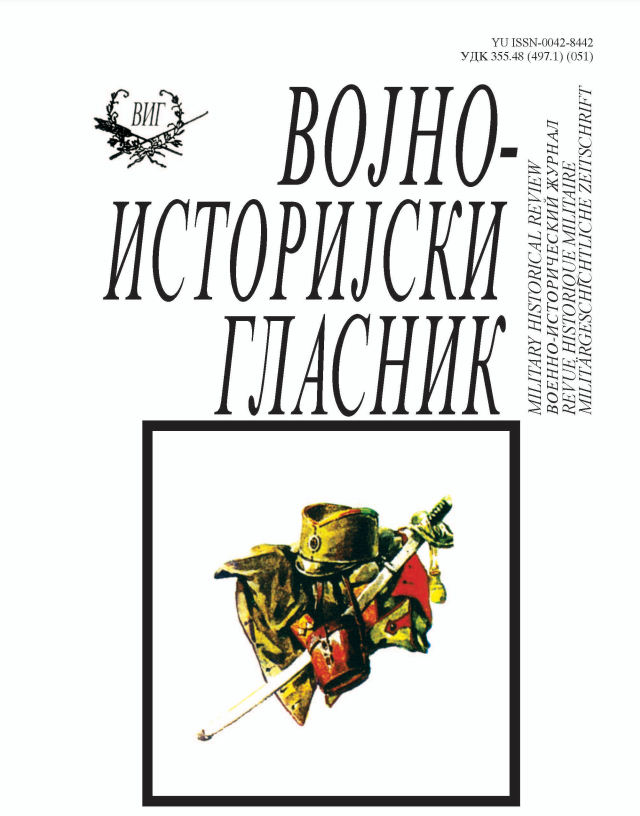ЛАЖНА НЕУТРАЛНОСТ: ЈУГОСЛОВЕНСКА ПОМОЋ ЗАПАДНИМ САВЕЗНИЦИМА И ГРЧКОЈ (1939–1941)
BOGUS NEUTRALITY: YUGOSLAV MILITARY ASSISTANCE TO WESTERN ALLIES AND GREECE 1939-1941.
Author(s): Mile BjelajacSubject(s): History, Military history, WW II and following years (1940 - 1949), Fascism, Nazism and WW II
Published by: Institut za strategijska istraživanja
Keywords: Yugoslavia; Greece; western allies; neutrality; World War II; aggression
Summary/Abstract: During the 1950s and 1960s it was common to portray Yugoslav policy after 1935 as pro German or pro Axes between the 1939 and March 27 1941. However, there was no a real ground for the such claims in the Yugoslav, French, American, Italian or German archives. Yugoslav military and Serbian public opinion were still in favor of its traditional Allies. Even Prime Minister Milan Stojadinović followed the British policy of appeasement with Germany and did his best to improve Yugoslav military capabilities as the factor of deterrent. French and British decline, and their attitude during the Rhineland crisis 1936 and Munich 1938 were warning sign for all their Eastern Allies and USSR. Historians Alfredo Breccia and Jacob B. Hoptner, have already cast more light on the nature of Yugoslav neutrality. They both come to conclusion that neutrality declared on September 2, 1939, indeed had not profound proGerman or pro-Italian attitude. This was sort of accommodation in order to overcome immediate consequences of an foreign engagement while it did not stabilize inner political cohesion after Serbian-Croat agreement in August 1939 as well as was far from being ready in fulfilling the armament program and war preparations yet. The status of neutrality facilitated Yugoslavia to import armaments and war materials from Germany and „neutral” Italy, as well as to freely navigate its fleet and evade German naval blockade. Those facts and motives were well known to Western Allies. Besides, Yugoslavia established close and clandestine military cooperation with France. It helped supplying Poland in September. It also welcomed initiative of General Weygand for creation of new Balkan front in a foreseen future. In the capital Belgrade, French established „Military Post” staffed with 31 men. Yugoslav army sent special delegation attached to French Supreme Command. Yugoslavs also replaced less skillful military attaché Colonel Gerba with their former representative to France General Predić (ethnic Serb). Both sides frequently exchanged intelligence reports. Those of Colonel Vauhnik, Yugoslav military attaché in Berlin, were of the great importance and accuracy. The Germans revealed all these facts after they captured filles of the French Supreme Command in Charité after the Armistice in June 1940. After the fall of France, Yugoslavia has turned to Britain but also to USSR and USA for supplies and assistance. However, its strategic position was aggravated daily. Germans enrolled in Romania, Italians were at its borders and on the see. When during the March 1941 Germans finally entered Bulgaria thus increasing pressure on Yugoslav leadership, forcing it gave up any further resistance and comply with demand to join the Axes on March 25. Only two days later a group of army officers staged a coup d’état and overthrew Prince Regent and acting Government. It was direct move towards the Allies but for the price. When the Axis responded with combined invasion. Yugoslavia collapsed after less than two weeks of resistance.. Meanwhile, Greece acted in the same way of bogus neutrality. However, impatient Mussolini invaded Greece from Albania on October 28 1940.. In that moment he acted without German consent. In preparatory propaganda for that endeavor Mussolini misused information that Germans previously captured in Charité. Yugoslav Royal House was in close ties with the Greek one, so Prince Regent Paul did as much as he could under the present circumstances to aid an old Greek ally. He ensured his counterparts that Yugoslavia would not allow Italians to bypass Greek right flank using Yugoslav territory. In spite of Italian bombardment of Bitolj (Monastir) Yugoslavia did not change its firm attitude. By using excuse of neutrality, it resisted repeated requests for letting Italians transit even for the supplies of food. In response Italy immediately halted shipments of armament, vehicles and aircrafts destinated to Yugoslavia. After tough negotiations Yugoslavia allowed them to pass with civilian supplies and red cross assistance for wounded in exchange for opening imortt of the vital goods from Italy, but not before Greeks ended up successfully their counteroffensive and forced Italians to entrench themselves.. Yugoslavia assisted its Greek ally with the considerable amount of ammunition especially for the 75 mm Schneider and 20 mm antiaircraft guns. In addition, Yugoslavia sent air bombs (200 tons), hand grenades (200.000 pieces), horses, several airplanes of older type, food and medical supplies. The Greek King personally expressed gratitude to Prince Paul for all those efforts in helping Greece in the moment of need. During the German spring campaign in 1941 Yugoslavia was of a little help for Greece since its southern front in Macedonia collapsed very quickly and Salonika port was overrun by the invaders. The part of Yugoslav army fled to Greece and withdrew southward along with the British and Greek forces but ended up in German captivity as well.
Journal: Vojnoistorijski glasnik
- Issue Year: 2020
- Issue No: 1
- Page Range: 109-135
- Page Count: 27
- Language: Serbian

